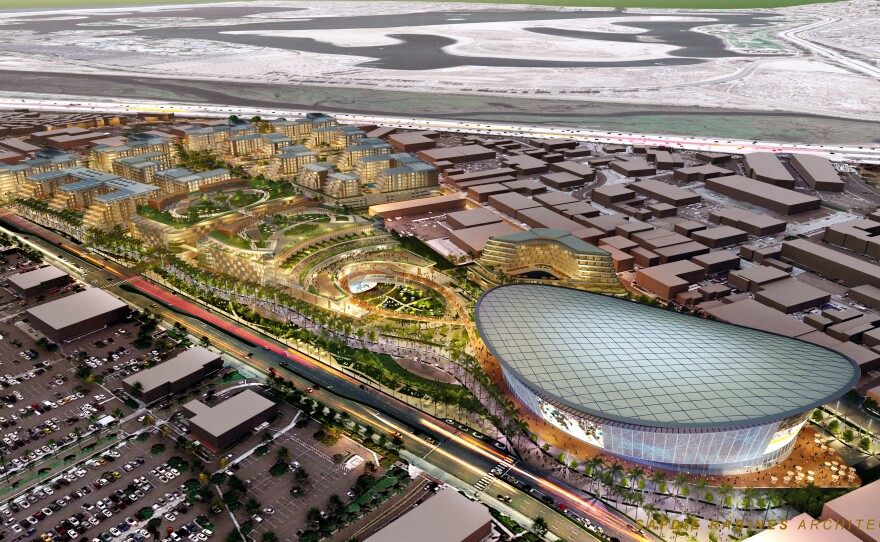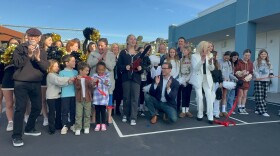The San Diego City Council Tuesday approved a negotiating agreement with developers who plan to revamp about 50 acres in the Midway district, including the Sports Arena area.
By entering an exclusive negotiating agreement with the developers on the "Midway Rising" project, the city has two years — with an option to add an additional year if necessary — to do due diligence and negotiate with Zephyr Partners, Chelsea Investment Corp. and Legends Global.
As Councilman Joe LaCava reminded the public at Tuesday's meeting, the council was not voting on a real estate transaction and no taxpayer dollars are being spent — at least not yet — saying this is just the next step in a long process before breaking ground on any redevelopment project.
Midway Rising is proposing 4,250 new homes — 2,000 affordable, 250 middle-income, and 2,000 market rate; a 450,000-square-foot arena with capacity for 14,500-16,500 people; a 200-room hotel and 250,000 square feet of retail and more than 11 acres of park and open space along with a 9.4-acre public plaza.
"I'm excited to announce that I am recommending an exclusive negotiation agreement with Midway Rising to redevelop the Sports Arena property," Mayor Todd Gloria said last week. "After a transparent process in accordance with state regulations, I am confident Midway Rising will deliver on my vision of creating thousands of new affordable and middle-income homes, good- paying local jobs, and a new world-class arena and entertainment district.
"This project represents big city energy and I look forward to getting this done for the Midway community and our city," Gloria said.
Chelsea is responsible for the project's affordable housing and Legends is tasked with the arena. Zephyr will construct market-rate housing if negotiations proceed to that point.
The City Council's Land Use and Housing Committee last week approved the "Midway Rising" project from the council's shortlist of three to redevelop the 48.5-acre site in the Midway-Pacific Highway Community.
Councilman Raul Campillo expressed concerns about the feasibility of the project, the lack of childcare-focused businesses proposed in the project's retail component and the "ballpark" numbers.
"I want affordable housing and I want affordable housing as fast as possible, but I want to vote for something I can believe," he said. "For this reason, I cannot support the city staff's recommendation today."
He was the sole no vote, with Councilwoman Vivian Moreno absent.
Before the vote Tuesday, it was reported that developer Brad Termini, founder and owner of Zephyr, gave $100,000 to an independent committee supporting Gloria's 2020 mayoral campaign
and had not disclosed 10 lawsuits his company has been embroiled in over unrelated development projects.
An article published last week in La Prensa pointed out the concerns, which led some government-watchdog groups to cry foul.
"Something is not right and it's time for the San Diego City Council to ask the hard questions before millions of public dollars are wasted," wrote the leaders of Alliance San Diego, Partnership for the Advancement of New Americans, Think Dignity, San Diego Housing Emergency Alliance and others in a joint statement. "All indications point to a lack of meaningful due diligence, which could jeopardize the future of this project and the benefit to our communities, including the viable development of much needed housing, including affordable housing."
San Diego's interim Chief Operating Officer Jay Goldstone chalked up much of the concern to other developers trying to gain an advantage in the selection of the project. He said city staff had done due diligence in investigating past litigation. Assistant City Attorney Leslie Fitzgerald echoed Goldstone's remarks, saying the City Attorney's office had found nothing that merited additional caution in the previous litigation in Monterey County.
The selection of a developer for an arena project will be moot, however, if San Diego voters do not pass Measure C this November, which would raise the 30-foot building height limit in the Midway District. It is the second attempt to increase the height limit in that neighborhood after a judge ruled the first ballot measure in 2020 illegal.
Last September, the City Council voted unanimously to declare the Sports Arena site as surplus land under the definition spelled out by the California Department of Housing and Community Development. The declaration also includes a condition that states the "future development include renovation or replacement of the city's current sports arena on the property as a regional entertainment venue and operation of that venue for concerts, sports and other events, consistent with similar arenas in large cities in the United States."
In May of this year, the council then trimmed down a shortlist of five to the current one of three, which includes the Gloria-favored Midway Rising as well as Midway Village+ and Hometown SD.
Developers had to mark 25% of proposed housing units as affordable and preference was given to developers with the highest number of proposed affordable units and the highest levels of affordability.
Redevelopment of the Sports Arena site is included as part of Midway- Pacific Highway Community Plan update, which was started in 2010 and serves as a blueprint for the future development of the neighborhood. The plan envisions the Sports Arena Community Village, which would incorporate a mix of entertainment, office, retail, residential, public and park uses.






